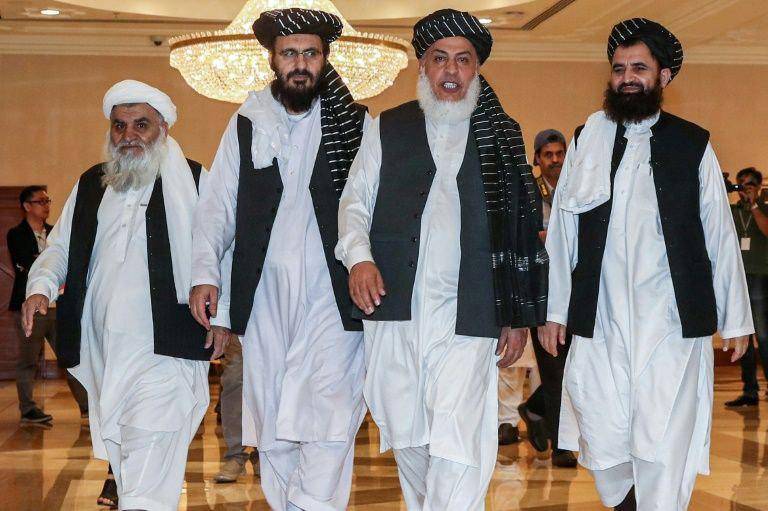As the US reached “at the threshold of an agreement” with the Taliban after ninth round of peace talks between the US’ Special Representative for Afghanistan Reconciliation- Zalmay Khalilzad and representatives of the militant group in Doha, vulnerable Afghans, particularly women, have become increasingly concerned about the consequences of such a likely agreement. The marathon direct talks, however, faces uncertainty after US President Donald Trump called off the talks in a series of tweets posted on Sunday morning. “I immediately cancelled the meeting and called off peace negotiations. What kind of people would kill so many in order to seemingly strengthen their bargaining position?” he tweeted about his secretly scheduled meeting with representatives of Taliban and President Ashraf Ghani at Camp David while challenging the Taliban how many more decades were they willing to fight.
Trump’s decision of calling off the peace negotiations, however, was warmly welcomed by most ordinary Afghans as they widely appreciated the decision on social media. The Afghan government also reacted to the news tweeting that “genuine peace is possible when the Taliban stop the killing of Afghans, embrace an inclusive ceasefire, and enter into direct negotiations with the Afghan government.”
To reflect the apprehension felt by the Afghan women, Etilaat-e-Roz reporter Maliha Kazemi spoke to several Afghan women and asked them whether peace with the Taliban poses any threat to the basic freedom of Afghan women.
Many women have emerged and made great achievements in the past 18 years, after the overthrow of the Taliban regime in 2001. A majority of these women have grown in the past years along with their basic rights.
Bahar Sohaili, a women’s rights activist, who left Kabul after the Taliban came into power in 1996, believes that the return of the Taliban is a regression for women in Afghanistan. “Women will be isolated and confined to their homes,” she noted.
“Women will be isolated and confined to their homes,”
Bahar Sohaili said.
Contrary to the Taliban rule (1996-2001), many Afghan women are now studying, working outside and are financially independent.
Zahra Yeganeh, a civil society activist from Kabul has grave concerns regarding the Taliban’s return. “The Taliban’s return reminds me back of the 1990s, the decade in which the women could not go out without the permission of their husbands, could not travel without a [male] companion, and did not have the right to get education and work,” she stated.
“The Taliban’s return reminds me back of the 1990s, the decade in which the women could not go out without the permission of their husbands, ”
Yeganeh said.
Mina Rezaee, founder of Simple Café in Kabul city, believes that every transformation like peace with the Taliban would impact her work and activities. “The Taliban’s return is very concerning for us, the women. Women will be a victim of the negotiations which increases my pessimism,” she noted, stressing that Afghan women rights and freedoms were currently fragile.
“The Taliban’s return is very concerning for us, the women. Women will be a victim of the negotiations which increases my pessimism,”
Mina noted.
Mina expressed concern that the Taliban did not adhere to people’s civil liberties. “Probably, we will not be able to practice our civil liberties like what to wear in terms of clothing, where we go, and we will not have our current freedoms,” she said.
She, however, warned that the women of Afghanistan will not remain silent if the Taliban returns and start imposing restrictions on women.
Sara Rezaee, a saleswoman in Kabul, is concerned that the Afghan society would become more conservative with the Taliban’s return to power. “I’m concerned that the society will return to its old belief which saw men as superior [than women], when the women did not have the right to make decision and speak,” she stated.
She asks the government to assure that the Taliban will not make a comeback, adding that there was no change in the Taliban. “Why do they continue their attacks and explosions, if they want peace,” Sara questioned.
Describing the Taliban as a terrorist group, Bahar Sohaili, says that the Taliban was not thinking of anything else other than spreading violence and killings.
Zahra Yeganeh expressed her doubts over the likely commitments of the Taliban in a peace accord, clarifying that “the Taliban would probably return to extreme believes and misogynic approach of the Islamic Emirate.”
Besides the different rounds of direct talks between the United States and the Taliban, representatives of the militant group have also attended three intra-Afghan talks with the Afghan politicians. The third intra-Afghan talks was held a few months ago in the Qatari capital of Doha.
The Taliban, however, have not made clear and detailed remarks about women rights so far.
“Women are entitled to inherit and to get married. Getting married is a personal decision for those [girls] who are mature and they can decide by their own about their marriage,” a Taliban negotiator, Qazi Delawar, said during the third intra-Afghan dialogue in Doha.
Sher Mohammad Abbas Stanekzai, who leads the Taliban negotiating team in different meetings, has said that their “Islamic Emirate” would remove any value in defiance to “Islamic rules.” However, his interpretation of the “Islamic rule” was not made clear whether he meant the Taliban rule like Islamic rule or something different.
The question is that will Frozan Amiri, 23, who works in a female beauty parlor in Kabul, be allowed to continue her work after a Taliban comeback?
Frozan was in third grade at school when the Taliban took over power. Women and girls were prohibited of schooling, back then. “I’m afraid that the situation will get even worse after making peace with the Taliban. I’m afraid that the situation will get as worse as no one will be able to get out of their homes,” she said, expressing concerns.




